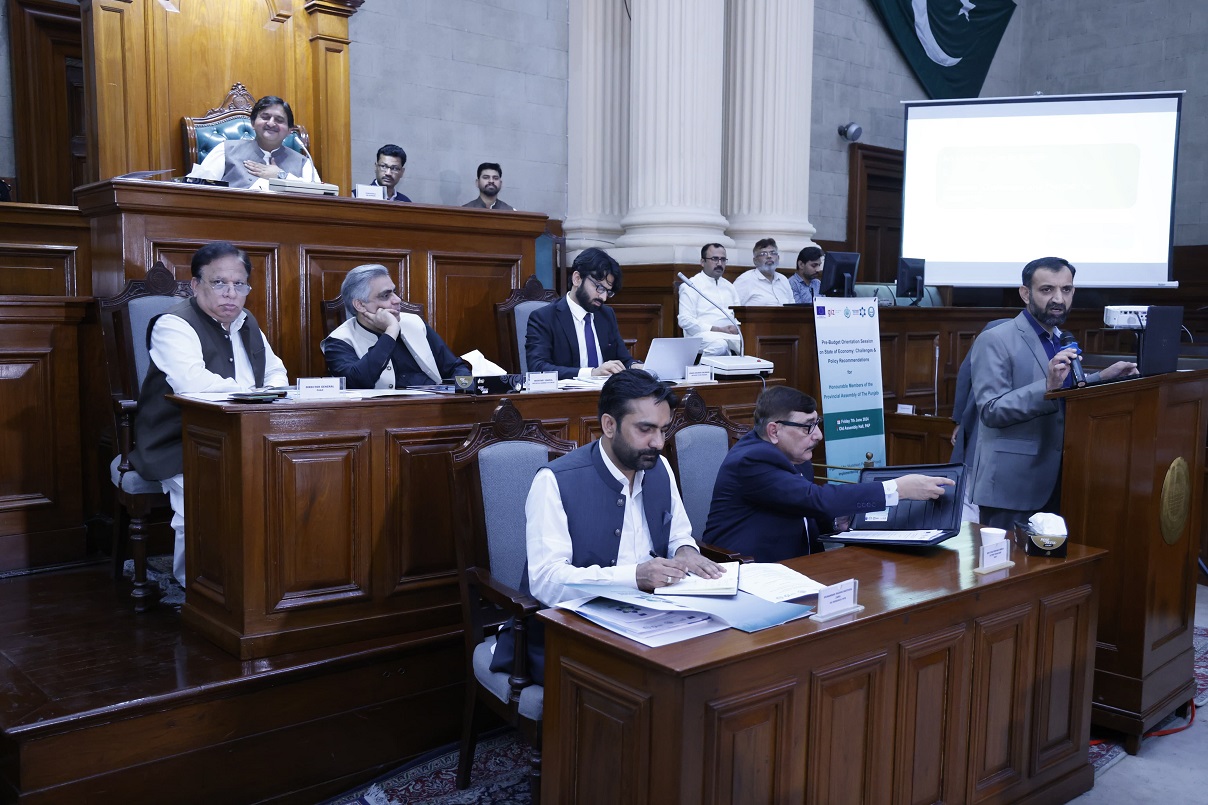
Lahore, June 07, 2024 – The Pakistan Institute for Parliamentary Services (PIPS) in collaboration with the Mustehkam Parlimaan (MuP) project, successfully organized a technical assistance session for the Honorable Members of Provincial Assembly of the Punjab on the State of the Economy and the Annual Budget 2024-25 in Lahore on 7th June 2024.
The event brought together an audience of more than 175 participants that included over 165 members of the provincial assembly including the Hon. Speaker, Malik Ahmed Khan, who presided and moderated all the proceedings of the session.
The team leader of Mustehkam Parlimaan Project, Mr. Pervez Abbas, gave the welcome remarks, he expressed the project’s resolve to assist Hon. Members in technical areas through the joint efforts with PIPS team and under the kind guidance of Punjab Assembly’s leadership.
In the inaugural address, the Hon’able Speaker of the Provincial Assembly of the Punjab, Malik Ahmed Khan, expressed gratitude to the PIPS and Mustehkam Parlimaan project teams for organizing the session on a very important subject. He informed the participants on the ongoing cross party initiatives taken by the incumbent leadership of the Assembly including the establishment of Parliamentary Development Unit, which is aimed to modernize the working mechanism of the Assembly in line with up-to-date global best practices. He urged all members to attend the session with full attention, highlighting its significance for their collective benefit. He outlined the session’s agenda and moderated the discussions.
Key topics of the event included a brief overview of the State of Economy facilitated by Dr. Wasim Shahid Malik, Professor of Economics / Former SBP Chair on Economics and the PIPS Adjunct Faculty. He discussed the essential budget publications including Budget in Brief and the Annual Budget Statement. He pointed out that the Federal Government, has aim to increase the tax revenue targets by 30-40 percent taking it to around Rs 12500 billion. Such high tax targets will hamper economic growth and pose inflation and unemployment challenges. He highlighted the concern that majority of the economic forecasts that are used for budget preparation at federal and provincial levels are prepared by the IMF and World Bank, stressing that the planning departments should make such forecasts, taking on board the relevant think tanks from private sector, that would be more inclusive and realistic. He highlighted that the budgetary allocations for the social sectors including education are getting meager shares, and the allocated amounts are not being spent through a productive manner, as our education sector needs an overhauling treatment on modern lines making it more practical to the industry needs and requirements at local and global level, instead of producing more graduates through decades old traditional approach.
The next speaker, Dr. Hafeez Pasha, the former Finance Minister of Pakistan, currently serving as Dean of Social Sciences at Beaconhouse University Lahore facilitated a very absorbing session titled “Does Pakistan needs a charter of economy?”. He stated that Pakistan is an emerging economy with high resource potential where it needs a sustained economic growth rate of over 5 percent. But due to multiple political and other related factors average growth has been restricted between 3 and 4 percent for the last decade. He pointed that the poverty rate in Punjab province has gone to 37 percent in recent years, meaning that 45 million people are living below the poverty line, this rate was once between 5-7 percent just few decades ago, such alarming situation calls for emergency initiatives to put the economic course on right track in a sustainable manner through efficient budgeting. He expressed that there’s myth that the National Finance Commission is prospering provincial governments and stressing at federal level, whereas we need to enhance our tax base to broaden the resource pie as our tax to GDP ratio is stuck below 10 percent since many years. He proposed Punjab Government should lower tax rate on services sector to attract the investment in the related sectors as Sindh has this rate at 13 percent and therefore successfully grabbing a big chunk of services sector comparatively. The industrial sector, particularly the exporting units should be facilitated with tax holidays and easy one window facilitation so as it may help enhancing employment and economic growth.
The last session on NFC and Fiscal Oversight was facilitated by Mr. Aizaz Asif, Senior PFM expert at MuP who presented the overview of new Rules of Procedure of Punjab Assembly appreciating their Committees related provisions. He stated that the committee have very important oversight role which remains active throughout the year to oversee the performance of the relevant departments and ensure the value for money while utilizing the allocated budget. Then, an intensive Q&A Session was conducted where Hon. Members asked questions from the worthy panelists related to economy and fiscal issues.
At the end the Honorable Speaker and the Members of Punjab Assembly thanked and appreciated PIPS and MuP Teams for organizing the very relevant and pertinent event. Mr. Muahmmad Rizwan Manzoor, Incharge PIPS Budget & Economy Desk and Mr Qaiser Iqbal (Librarian ) were the focal person for the coordination and execution of the event from PIPS side.